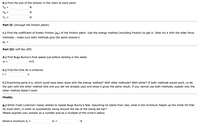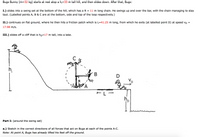
Elements Of Electromagnetics
7th Edition
ISBN: 9780190698614
Author: Sadiku, Matthew N. O.
Publisher: Oxford University Press
expand_more
expand_more
format_list_bulleted
Question

Transcribed Image Text:b.) Find the size of the tension in the chain at each point.
TA =
N
TB
N
%3D
Tc =
Part II: (through the friction patch)
c.) Find the coefficient of kinetic friction (uk) of the friction patch. Use the energy method (including friction) to get it. (Also try it with the older force
methods-- make sure both methods give the same answer!)
Part III: (off the cliff)
d.) Find Bugs Bunny's final speed just before landing in the water.
Vf =
m/s
e.) Find the time he is airborne.
t =
S
f.) Examining parts d-e, which could have been done with the energy method? With older methods? With either? If both methods would work, re-do
the part with the other method (the one you did not already use) and show it gives the same result. If you cannot use both methods, explain why the
other method doesn't work.
Finally:
g.) Elmer Fudd (unknown mass) wishes to repeat Bugs Bunny's feat. Assuming he starts from rest, what is the minimum height up the initial hill that
he must start, in order to successfully swing around the top of the swing set bar?
Please express your answer as a number and as a multiple of the circle's radius.
Elmer's minimum hi
m =
• R
%D

Transcribed Image Text:Bugs Bunny (m=32 kg) starts at rest atop a h;=33 m tall hill, and then slides down. After that, Bugs:
I.) slides into a swing set at the bottom of the hill, which has a R = 11 m long chain. He swings up and over the bar, with the chain managing to stay
taut. (Labelled points A, B & C are at the bottom, side and top of the loop respectively.)
%|
II.) continues on flat ground, where he then hits a friction patch which is L=41.25 m long, from which he exits (at labelled point D) at speed vp
17.98 m/s.
III.) slides off a cliff that is hp=17 m tall, into a lake.
C
h,
D
Vo
R
FL-
Part I: (around the swing set)
a.) Sketch in the correct directions of all forces that act on Bugs at each of the points A-C.
Note: At point A, Bugs has already lifted his feet off the ground.
Expert Solution
This question has been solved!
Explore an expertly crafted, step-by-step solution for a thorough understanding of key concepts.
This is a popular solution
Trending nowThis is a popular solution!
Step by stepSolved in 4 steps with 2 images

Knowledge Booster
Learn more about
Need a deep-dive on the concept behind this application? Look no further. Learn more about this topic, mechanical-engineering and related others by exploring similar questions and additional content below.Similar questions
- Please help mearrow_forwardStudents are given two spherical balls made of different materials, but of identical mass and diameter to experiment with. Each ball is dropped from an initial height, h0. The “sad ball” comes to rest without visibly bouncing when it strikes the tabletop. The “happy ball” bounces up to a final height h, where h< h0 A fellow student wants to use one of the balls in a carnival game where cups are knocked over by a thrown ball. Which ball should they use, happy or sad? Why?arrow_forwardPhysics 121 Spring 2021 - Document #11: Homework #04 & Reading Assignment page 4 of 8 Problem 1: Gnome Ride - This from a Previous Exam I. A Gnome of given mass M goes on the Gnome Ride as follows: He stands on a horizontal platform that is connected to a large piston so that the platform is driven vertically with a position as a function of time according to the following equation: y(t) = C cos(wt) Here w is a constant given angular frequency, C is a given constant (with appropriate physical units) and y represents the vertical position, positive upward as indicated. Part (a) - What is the velocity of the Gnome at time t = 0? Explain your work. Present your answer in terms of the given parameters Part (b) – What is the net force on the Gnome at time t = 0? Explain your work. Present your answer in terms of the given parameters Part (c) – What is the Normal Force on the Gnome at time t = 0? Explain your work. Present your answer in terms of the given parameters Some Possibly Useful…arrow_forward
- 10. Wedge Hammer A B 45° -450 mm Fig. 3.20 Neglecting the small amount by which the hammer rises after passing through the vertical through A and assuring that the hammer does not rebound, find the value of R Fig. 3.20 shows a tilt hammer, hinged at 0, with its head A resting on top of the pile B. The hammer, including the arm OA, has a mass of 25 kg. Its centre of gravity G is 400 mm horizontally from O and its radius of gyration about an axis through G parallel to the axis of the pin O is 75 mm. The pile has a mass of 135 kg. The hammer is raised through 45° to the position shown in dotted lines, and released. On striking the pile, there is no rebound. Find the angular velocity of the hammer immediately before impact and the linear velocity of the pile immediately after impact. Neglect any impulsive resistance offered by the earth into which the pile is being driven. [Ans. 5.8 rad/s, 0.343 m/s]arrow_forwardshow each step for answerarrow_forwardPart a) Determine the force exerted by his seat on a 170-lb rider at B and D Part b) Determine the minimum value of the radius of curvature at E if the roller coaster is not to leave the track at that point.arrow_forward
- A projectile object reaches a height of 430 m, if it is fired straight up using a spring-loaded gun. Using the same gun, what is the maximum height (m) that can be reached by the projectile if it fired at an angle of 31 ° from the vertical?arrow_forwardHello. Answer is s=0.42m (how far the spring goes down before stopping the object falling). I am uploading this question as the example answer's working out was bad I find it hard to follow. I would like to see working out how the calculations equate to the answer being s=0.42marrow_forwardFrom rest a balloon begins to rise. the Balloon experiences a lift due to a buoyant force of 8000 N. 1. Total massof the balloon is 600kg. Find Acceleration. 2. The balloon rises a distance of 10m and loses a mass of 50 kg after a weight is thrown off. Find the acceleration of the balloon after this weight loss 3. Find the initial velocity of the mass in the vertical direction at the timeof the jump. 4. After falling 10 m, find the mass' final velocity as it comesinto contact with the ground. 5.What is the total time the mass takes to hit the ground? 6. Find the heightof the balloon when the mass hits the ground 7. The mass lands 3 m from the baloon, find the horizontal velocity required to land 3m from the balloon. 8. Since the balloon exeperiences equal forces when the mass is thrown off, what is the horizontal velocity the baloon experiences during this act and how far does the balloon travel when the mass comes into contact with the ground?arrow_forward
- 4. Please provide full body diagram with explanationarrow_forwardA 40-kg disk shown is pin supported at its center. It starts from the rest and rotates to attain an angular velocity of 2 rad/s. The disk is acted upon by a constant couple moment M = 10 N.m clockwise. The spring is originally unstretched and its cord wraps around the rim of the disk. 0.2m ww Ol = a) (10 points) Find the kinetic energy of the disk. b) (30 points) Determine the angle through which the disk rotatesarrow_forwardDon't use chatgpt. I need handwritten solution with free body diagram.arrow_forward
arrow_back_ios
SEE MORE QUESTIONS
arrow_forward_ios
Recommended textbooks for you
 Elements Of ElectromagneticsMechanical EngineeringISBN:9780190698614Author:Sadiku, Matthew N. O.Publisher:Oxford University Press
Elements Of ElectromagneticsMechanical EngineeringISBN:9780190698614Author:Sadiku, Matthew N. O.Publisher:Oxford University Press Mechanics of Materials (10th Edition)Mechanical EngineeringISBN:9780134319650Author:Russell C. HibbelerPublisher:PEARSON
Mechanics of Materials (10th Edition)Mechanical EngineeringISBN:9780134319650Author:Russell C. HibbelerPublisher:PEARSON Thermodynamics: An Engineering ApproachMechanical EngineeringISBN:9781259822674Author:Yunus A. Cengel Dr., Michael A. BolesPublisher:McGraw-Hill Education
Thermodynamics: An Engineering ApproachMechanical EngineeringISBN:9781259822674Author:Yunus A. Cengel Dr., Michael A. BolesPublisher:McGraw-Hill Education Control Systems EngineeringMechanical EngineeringISBN:9781118170519Author:Norman S. NisePublisher:WILEY
Control Systems EngineeringMechanical EngineeringISBN:9781118170519Author:Norman S. NisePublisher:WILEY Mechanics of Materials (MindTap Course List)Mechanical EngineeringISBN:9781337093347Author:Barry J. Goodno, James M. GerePublisher:Cengage Learning
Mechanics of Materials (MindTap Course List)Mechanical EngineeringISBN:9781337093347Author:Barry J. Goodno, James M. GerePublisher:Cengage Learning Engineering Mechanics: StaticsMechanical EngineeringISBN:9781118807330Author:James L. Meriam, L. G. Kraige, J. N. BoltonPublisher:WILEY
Engineering Mechanics: StaticsMechanical EngineeringISBN:9781118807330Author:James L. Meriam, L. G. Kraige, J. N. BoltonPublisher:WILEY

Elements Of Electromagnetics
Mechanical Engineering
ISBN:9780190698614
Author:Sadiku, Matthew N. O.
Publisher:Oxford University Press

Mechanics of Materials (10th Edition)
Mechanical Engineering
ISBN:9780134319650
Author:Russell C. Hibbeler
Publisher:PEARSON

Thermodynamics: An Engineering Approach
Mechanical Engineering
ISBN:9781259822674
Author:Yunus A. Cengel Dr., Michael A. Boles
Publisher:McGraw-Hill Education

Control Systems Engineering
Mechanical Engineering
ISBN:9781118170519
Author:Norman S. Nise
Publisher:WILEY

Mechanics of Materials (MindTap Course List)
Mechanical Engineering
ISBN:9781337093347
Author:Barry J. Goodno, James M. Gere
Publisher:Cengage Learning

Engineering Mechanics: Statics
Mechanical Engineering
ISBN:9781118807330
Author:James L. Meriam, L. G. Kraige, J. N. Bolton
Publisher:WILEY